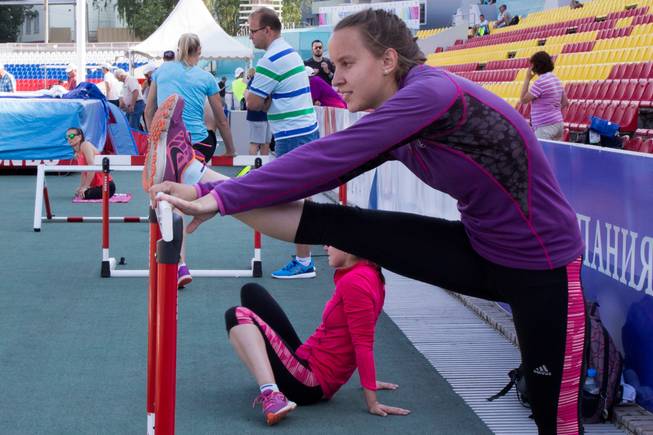
Francesca Ebel / AP
Russia’s athletes warm up Sunday, June 19, 2016, during a training session prior to the national track and field championships at a stadium in Cheboksary, Russia. The Russian national track and field championships were supposed to offer a chance to secure Olympic places, but with Russia’s athletes now banned from the Rio games, excitement for competition has been replaced by despair and defiance.
Sunday, June 19, 2016 | 6:53 p.m.
Related story
CHEBOKSARY, Russia — Russia's national track and field championships were supposed to offer a chance to secure Olympic places, but with its athletes now banned from the Rio Games, excitement for competition has been replaced by despair and defiance.
For Natalya Antyukh, the reigning Olympic champion in the 400-meter hurdles, Rio would almost certainly be her last chance for a medal at the age of 34.
"The mood has been spoiled," Antyukh told The Associated Press on Sunday, adding that she had kept the Olympics as an "imaginary goal" for herself in the seven months that separated Russia's suspension in November from the IAAF vote Friday that upheld the Olympic ban.
"When you lose this imaginary goal, the motivation is lost. I am an experienced athlete and I was always giving myself a new goal and motivation. But what can I achieve now?"
The championships start Monday in a stadium in the Volga River city of Cheboksary, with the likely small crowd a far cry from the pulsating atmosphere of the Olympics. Pre-event training Sunday took place in sweltering heat, with many athletes reluctant to venture out until late afternoon.
Some at the championships are angry at the International Association of Athletics Federations. Shot putter Yuri Kuzev even argued that Russia should have boycotted Olympic track and field events from the beginning rather than suffer the embarrassment of being banned.
"We should have rejected to go to the Olympics from the very beginning and not follow their orders," he said.
That would have avoided a lengthy checklist of reform demands from the IAAF, ranging from extra testing for top athletes to investigating past doping offenses and shutting down a notorious training center whose athletes produced more than 30 failed tests.
"They (IAAF) created a dictatorship. Saying 'do this, do that', and we simply followed," Kuzev said. "But all this work was done for nothing, getting the same decision. I think it was pointless to do that."
Russia had hoped that an IAAF ban could be overruled by the International Olympic Committee, which has convened a summit for Tuesday to discuss the issue of Russia's status. However, that appears unlikely after the IOC said Saturday that it "fully respects" the IAAF ruling.
Russia's last chance is likely to be an appeal to the Court of Arbitration for Sports. Two race walkers said Sunday they had applied for CAS to rule on the issue.
However, even the IAAF ban leaves open an avenue for a select few Russians to compete at the Olympics.
A provision allowing athletes to compete under "neutral" status can apply to those who can show they have been living and training abroad, under a more rigorous system of anti-doping tests than Russia's, which is currently mostly suspended following persistent allegations it covered up for doped stars.
Among those who could benefit is 800-meter runner Yulia Stepanova, whose testimony to the World Anti-Doping Agency about drug use helped to spark an unprecedented investigation. There's also a chance for long jumper Darya Klishina, who has long been based in the United States, well away from the embattled Russian track and field system.
Her coach Loren Seagrave was reluctant to talk about Klishina's plans, but told the AP that the turmoil in Russian track and field had no impact.
"Darya's preparation has not been affected at all," he said. "She's been out of Russia now for almost eight months and (has) been tested on a regular basis - (so this decision) doesn't affect her preparation at all."
If Klishina is to compete, it wouldn't be under the Russian flag, but a neutral symbol, perhaps the IOC's emblem. Meanwhile, dozens of other Russians look set to stay at home.
AP Sports Writer James Ellingworth in Carry-Le-Rouet, France, contributed to this report.

Join the Discussion:
Check this out for a full explanation of our conversion to the LiveFyre commenting system and instructions on how to sign up for an account.
Full comments policy